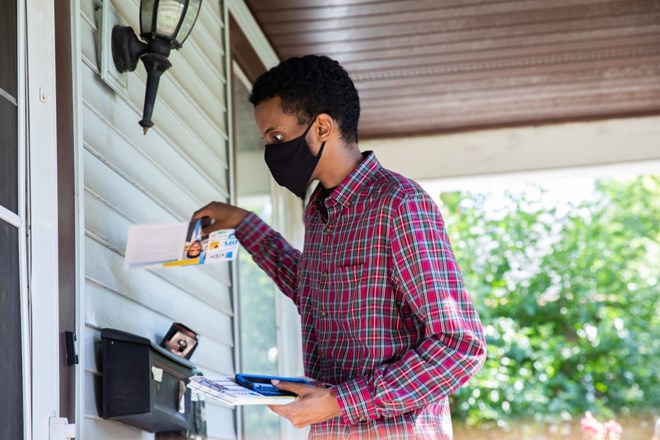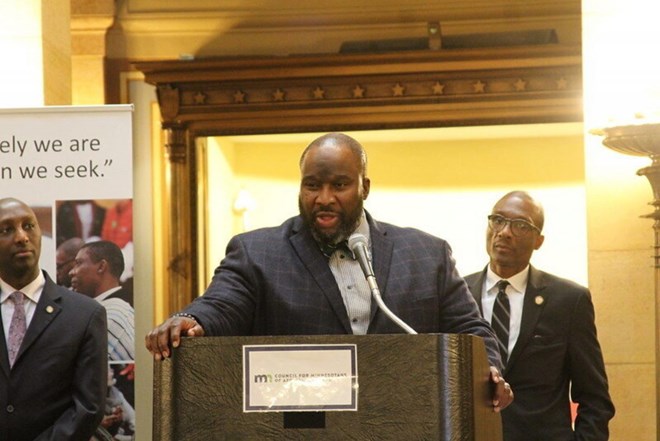
BY JOEY PETERS
Wednesday August 12, 2020
After easily claiming the DFL endorsement, Omar Fateh turned activist support into a seeming primary win against DFL powerbroker Jeff Hayden.

Omar Fateh knocks doors for support in East Phillips one day before the August 11 primary election. Credit: Jaida Grey Eagle | Sahan Journal
In a night for DFL primary challengers, a south Minneapolis state senate seat will likely get a new voice for the first time in nearly a decade.
Omar Fateh, a 30-year-old business-systems analyst at the University of Minnesota, held a sizable lead over state Senator Jeff Hayden late Tuesday evening in one of the state’s most contested DFL primary elections.
Omar led Hayden by nearly 2,000 votes and 11 percentage points in the tallied vote, with 92 percent of precincts reporting. Dawson Kimyon, Omar’s campaign manager, declared victory Tuesday night in a phone call with Sahan Journal. Hayden did not immediately return phone calls or texts about the results late Tuesday.
Omar’s likely win comes as an upset against one of the Senate’s highest-ranking DFL members in a south Minneapolis district where people of color make up the majority.
If his lead holds, Omar, who is the son of Somali immigrants, will go on to face Republican Bruce Lundeen this November in District 62. The district historically votes overwhelmingly for DFL candidates.
In many ways, the election between Omar and Hayden came to represent a local version of a broader contest in the Democratic party, where left-wing candidates of color have taken on the party establishment. Omar ran as a democratic socialist and supported proposals like a statewide $15 minimum wage, defunding the Minneapolis police and free college.
Hayden, while describing himself progressive, tended to emphasize his experience and legislative record. He pointed to his work drafting a police reform bill that passed during the last special session, his support for gay marriage and his success in bringing money to community organizations in District 62.
On its north end, the district includes the Phillips neighborhood and Ventura Village, Stevens Square and Whittier. It extends to Powderhorn Park, where police officers killed George Floyd, and stretches southwest to more affluent neighborhoods like Lyndale, Kingfield and Tangletown.
About 55 percent of the district’s population are people of color, and roughly 26 percent were born in other countries, according to the nonprofit mapping and data site Minnesota Compass.
Both Omar and Hayden are Black, but in their campaigns they’ve described different backgrounds. Hayden lives in the Bryant neighborhood, a part of Minneapolis’s historic Southside and a central region for the city’s Black community for much of the 20th century. Hayden, 53, comes from a family with deep roots in Minneapolis, which he has touted on the campaign trial.
“My family has been living in this community for 100 years,” Hayden said. “Now, I’m not 100 years old, but I’m really rooted here.”
He first won a seat in the state house in 2008, at the time, becoming one of just two Black legislators. In 2011, Hayden won a special election for his current state senate seat, and went on to handedly win reelections in 2012 and 2016. Hayden is one of four assistant minority leaders in the Senate.
Omar lives in the Phillips neighborhood. His father and mother came to the U.S. from Somalia in the 1960s and ‘70s respectively. Omar grew up in Annandale, Virginia, near Washington D.C., and moved to Minneapolis five years ago.
Omar ran unsuccessfully for state representative two years ago, coming in third place in the district currently occupied by Hodan Hassan. This time, however, Omar drew support from groups like Sunrise Movement, the Democratic Socialists of America, and Our Revolution.
Hayden’s endorsements came from the top echelons of the DFL, including Governor Tim Walz and Attorney General Keith Ellison. He also garnered support from public employee unions like AFSCME and the AFL-CIO. But Hayden failed to gain one important endorsement: that of the DFL itself.
The public—and, presumably, Hayden—discovered the seriousness of Omar’s challenge in early May, when Omar won nearly three quarters of the votes from DFL delegates during a virtual convention. That surprise gave him the party endorsement. Omar attributes that huge majority to the work of campaign volunteers, who bombarded delegates with phone calls during the endorsement process.
Hayden questioned the process of the virtual convention, alleging that delegates who live outside of the district voted in it.
The district chooses an activist in the community over a powerbroker at the capitol
Omar said he gained this support mainly from listening to delegates and voters, and showing up as a community activist. He asserted that Hayden, by comparison, was often a remote presence.
“He’s not someone who would return phone calls or emails,” Omar said. “I think, whether or not you support an issue or a bill, maintaining that line of open communication is most important.”
If there was a recurring criticism of Hayden during the race, it was this: Hayden spent most of his time doing business in the legislature.
“He’s really well known and has a lot of power at the capitol,” said Jason Chavez-Cruz, the president of the Youth Caucus of the DFL and an Omar supporter. “But that doesn’t transfer to having a lot of power within your district.”

Supporters of Jeff Hayden, pictured here, cited his institutional acumen at the Capitol as an asset. Credit: Photo courtesy of Hayden for Senate
Chavez-Cruz particularly supported Omar’s position to allow rent control by ending a statewide ban on the policy. The issue, Chavez-Cruz said, is personal. During the Great Recession, his parents lost the family’s south Minneapolis house to foreclosure and eviction. His parents, who immigrated to the U.S. from Mexico, ended up moving the family to Richfield.
“We talk a lot about funding for housing at the capitol, but nothing else to support communities that are actually being displaced,” Chavez-Cruz said.
Bruce Ferguson, who lives in the Powderhorn Park area, prepared to vote for Omar on Tuesday afternoon at the Sabathani Community Center. Ferguson said he supported Omar because he wanted candidates who are prepared for the current political moment, especially in the wake of Floyd’s death.
“It’s not really ideology for me or policy,” Ferguson said. “It’s more just sensitivity to the speed at which these issues move. I feel like a lot of the incumbent candidates move at their own pace—a pace that isn’t conducive to the type of outcomes we want to see in our community.”
‘He’s the most qualified’
Some of Hayden’s prominent backers cited his presence at the capitol as an asset to his constituents. Former State Representative Karen Clark, who served many of the same neighborhoods for decades in the statehouse, pointed to Hayden’s recent work on COVID-19 relief measures during the general session and two special sessions.
“If he’s vulnerable, it’s because he was doing his job,” Clark said. “He’s spending the time doing the work that needs to happen, in a leadership position, in the minority party. When you’re in the minority and in leadership, you have to put twice as much work in.”
Hayden’s institutional acumen is one of Clark’s biggest reasons for supporting him. Should the DFL win a Senate majority this year, Hayden’s current leadership position in the Senate could make him chair of one of the body’s health committees. This, Clark emphasized, would give him a key role in influencing the state’s health budget—to the great benefit of voters.
“You can look at people’s records, and you can look at people’s words,” Clark said.
Hayden’s base seemed to come from people in the district who’d voted for him before. Rowena Holmes, who lives in the West Phillips neighborhood, grew up with Hayden’s father in what today is the Central neighborhood in south Minneapolis. Holmes cast her ballot for Hayden late Tuesday afternoon.
“He knows what he’s doing,” Holmes said. “He’s the most qualified. I have no reason to choose anyone else.”
Campaigning in the rain
In the days leading up to the election, Hayden stepped up his presence at neighborhood events, and spoke enthusiastically about Omar’s challenge.
“I don’t ever think that every four years that I should be able to just walk into office,” Hayden said.
A thunderstorm abruptly interrupted a Sunday afternoon rally by the East Phillips Neighborhood Institute to support a project to turn an old warehouse on East 28th Street into an urban organic community farm. Hayden showed up anyway.
Under the flimsy protection of a canopy pop-up tent, Hayden reminded people how he, as a legislator, helped secure more than $300,000 for the Indoor Urban Farm Project, in the old Roof Depot building. Those funds went to designing blueprints for an aquaponics facility (which will produce salad greens and fish) and 28 affordable housing units. Once the rain cleared, he worked his way through whatever was left of the crowd, passing out campaign pamphlets and reminding people to vote in the primary.
Hayden argued that projects like this demonstrate his connection to the community. “I take a little exception when someone says that I don’t work on the issues and they haven’t done the research,” he said.
It also gave Hayden a chance to paint Omar as an outsider, unfamiliar with how the legislative process works. “My opponent seems to be pretty organized and has some help,” Hayden said. “And, you know, that’s democracy.”
Lawn signs and door knocking
On the Monday afternoon before Election Day, Omar door knocked alone in the East Phillips neighborhood. He was targeting voters who’d previously told his campaign they were leaning toward Hayden. At one point, Omar greeted a house with one of his yard signs on the front lawn and approached it to make sure they’d already voted.
Ahmed Abdi, who lives in the house, told Omar that he’d already won votes from four of his family members. He intended to cast his own ballot later that day.
When asked by a reporter why he supports Omar, Ahmed said he and his families are proud of their Somali culture and want to see a new face in office.
“Thank you,” Omar told him